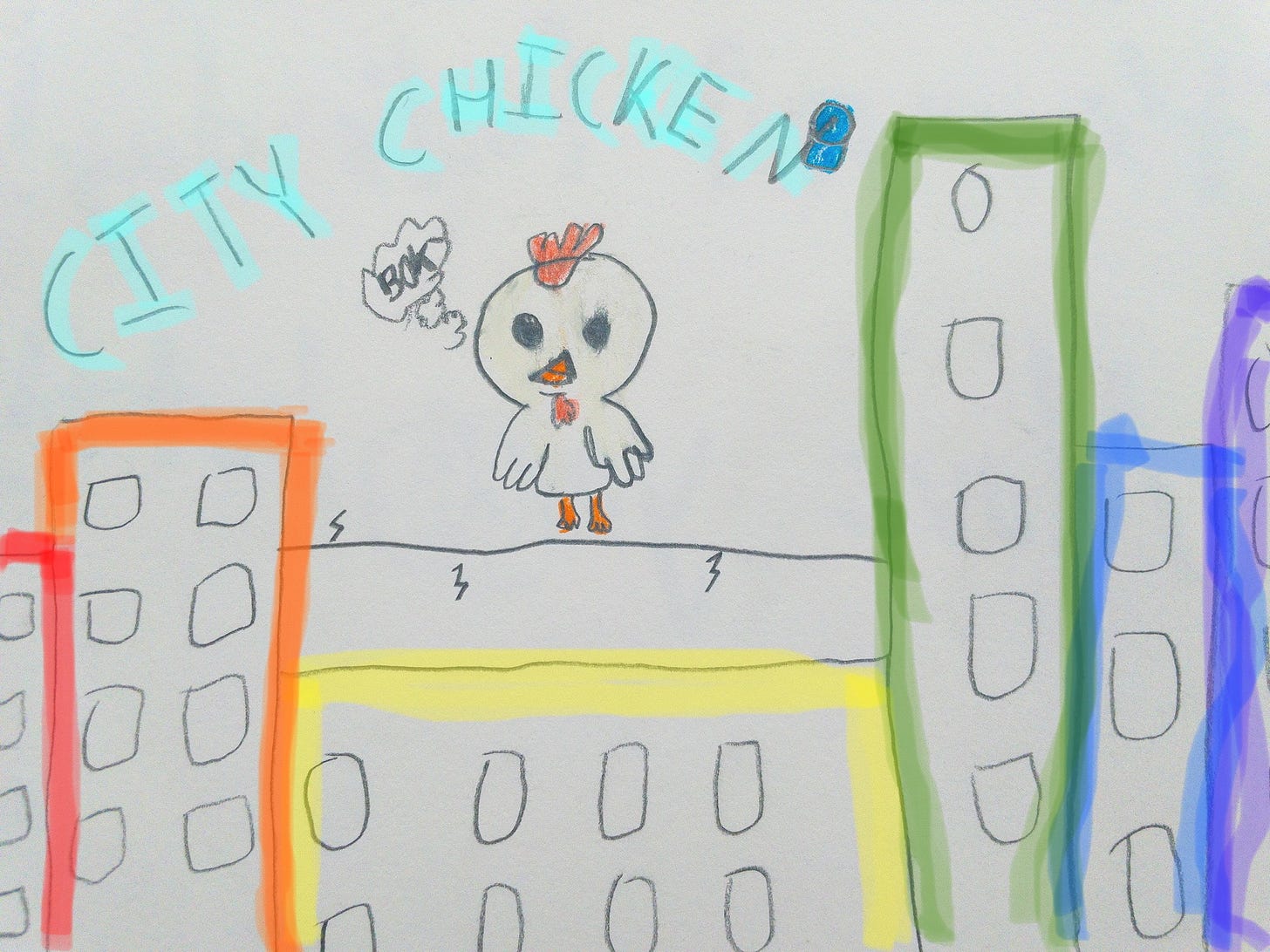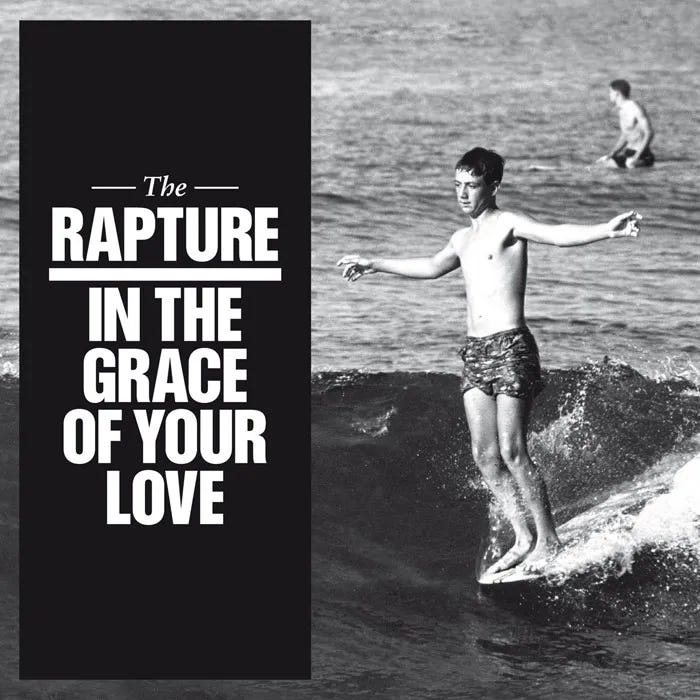Dad Rock is Playing at My House, My House
I’m Writing a Book and Making a Mixtape — Notes on The Rapture

If you follow me on any social media platform, you will likely already be tired of knowing that, as of a few weeks ago, I have an official deal with Plume to write DAD: A POP HISTORY, the cultural history of the “dad” that I’ve been working on for several years now. I am VERY excited about this, if you can’t tell. Anyway, you’ll be hearing an excruciating amount about this from me in the lead-up to Father’s Day 2027, but, in the meantime, I wanted to share something else with you.
When I got the deal, I celebrated privately in two specific ways. The first way was that I bought myself a new pair of sneakers. I chose a pair of Nike Air Max 1’s in Crepe Hemp, which is a shoe that was produced in 2022 and is a throwback to a vintage 2004 colorway. I bought these shoes because they are precisely my aesthetic but also because my arches hurt, and Air Max 1’s have extremely stable interior support that helps prevent pronation. A very dadly business, this.
The other thing I did is that I impulsively created a playlist. I pulled up a fresh one in Spotify, titled it “DAD / POP,” spent maybe five minutes plopping tracks into it, took the dogs on a walk, and took the mix for a spin. I’ve been futzing and editing and adding and subtracting since then. The list is both a hype-up mix for the writing of the book as well as a piece of documentary evidence of the book’s subject. I wanted it to be an expression of both what I think dad culture is, in an analytical sense, and also what it specifically and personally means to me.
There are twelve tracks — every mixtape should be twelve tracks long, come at me, bro — and I’m going to write about each one, in order, dropping the full playlist at the end. So, to begin, track one:
I was not cool enough to be into The Rapture when they broke. The Rapture came up as a part of the dance punk or disco punk revival when I was in college in the early aughts. Their debut album Echoes was only the sixth official release from DFA Records, the label started by James Murphy of LCD Soundsystem, and it preceded the dancefloor earthquake of “Daft Punk is Playing at My House” by a full two years. But I didn’t know that then. I was too busy being hyped up about Wilco at the time (about which, obviously, much much more later).
Anyway, I didn’t come around to The Rapture until their third album, In the Grace of Your Love in 2011. I was at a different time of my life, and so were they. I was engaged (to a person who absolutely was cool enough to know about The Rapture back in 2003), and I was in the midst of finishing grad school. I was, in other words, growing up to a certain extent, and In the Grace of Your Love was an album that was about that.
As the writer Andrew Gaerig, reviewing the album for Pitchfork, put it:
Grace is the band's mature album, by their own reckoning: Press for the record has almost unanimously focused on the members' stroller-pushing benders, how frontman Luke Jenner spent time playing softball, attending church, and coping with the loss of his mother. Stability and love dominate its themes.
He goes on to say that the album is the work of, “a patient, skilled rock band unafraid to look uncool.”
This is, probably coincidentally, an echo of Rob Mitchum’s coinage of the term “dad rock” at Pitchfork four years earlier in a review of Wilco’s sixth album. “An album of unapologetic straightforwardness,” Mitchum wrote, “Sky Blue Sky nakedly exposes the dad-rock gene Wilco has always carried but courageously attempted to disguise.” Grace is The Rapture’s dad rock opus, an album about loss, about aging, about growing up (which is different from aging). The album is not itself uncool so much as it is “patiently,” “skillfully” about being uncool.
“It Takes Time to Be a Man” is the album’s closer. Built around a loping piano sample from a 1969 The People’s Choice record, the song stays firmly in its own pocket for much of its run time. The final track on the final Rapture album, it firmly eschews the band’s youthful disco punk aggression in favor of a kind of Mac Millerite ease. It sounds like a backyard barbecue, like having a beer on your stoop, like a commercial that ends with the phrase, “enjoy responsibly.” It’s a sonic retirement, in a good way.
Lyrically, the song is pretty corny. As Gaerig notes in his review, the band had never had much of a poetic sensibility, but this song includes a frankly cringeworthy amount of dentist-office inspirational poster wisdom.
Well we're all getting bigger
But it takes time to be a man
And it's more than you figure
Well take it slow and take my hand
This is both how the song starts and how it continues. It’s not a figure for anything; it’s genuinely about offering really basic, vague-to-the-point-of-nothingness bromides on responsible manhood. This is the definition of “unafraid to be uncool,” just dispensing anodyne life advice over a hand-carved R&B sample. Late in the song, they sing, “well, there's room in your heart now for excellence to take a stand.” What? Ok! Ask for help! Rely on your friends! Be excellent to each another!
The line that gets me, though, is the one refrain in the song that seems like it can signify in multiple directions. The song’s nominal chorus is:
I bet you can't get what you want
Come on baby come on darling
I bet you can't get what you need
Come on sugar and try
The refrain is satisfying, in part, because its phrasing breaks the pattern of the verses, but also because, on its own, “I bet you can’t” introduces an ambivalence to the song that’s missing elsewhere. “I bet you can’t get what you want” reads two ways. On one hand, colloquially, the phrasing means I think you’ll probably be able to get what you want, or even I dare you to get what you want, but, on the other hand, it quite literally means, I’m pretty sure you won’t be able to get what you want. Confidence and uncertainty, optimism and worry.
A lot of the way that “dad culture” gets framed culturally is through narratives of loss. I used to be cool, I used to be young, I used to be whatever. To some extent, then, the idea of the dad as an inhabitable character is about swapping out one cultural value for another, leaning into a new identity. That was as true for veterans in the postwar suburbs as it is for former dance punk hipsters pushing strollers in Brooklyn. There are, of course, other ways of describing the forward movement of time and age that are not predicated on losing: evolution, adaptation, maturation, education. These things happen whether you consciously “let go” of a past self or not. But, as has been a theme throughout human history, culture works overtime to create incentive structures for helping men embrace, or at least tacitly accept, the passage of time. The Rapture’s call, at least, is a gentle one, an easy wade into the process of getting washed. Come on, sugar, and try.
Shows I’m Watching
We’re in between screeners right now — some I’m excited to tell you about, some I will politely never say a word about. At the moment, I’m just re-watching a couple shows for book research. Those shows? Modern Family and Transparent. I’m toggling back and forth, episode by episode. Modern Family, then Transparent, then Modern Family, then Transparent. You can almost hear the tonal shifts out loud, like record scratches or screeching breaks. Sometimes, my ears pop. Do not try this at home.
Stuff I Wrote
For The New Republic, I wrote about whether or not Michelle Williams is the greatest — or at least most — Millennial actor in a review of her extraordinary new show Dying for Sex.
I also wrote, for TNR, about how Netflix’s Adolescence is way more interested in the texture of parental panic than it is about the inner lives of its titular adolescents.
And, back in February, I appeared on episode of Anne Helen Petersen’s Culture Study podcast to talk about my “Dad Culture Studies” class, and that interview led to this little feature in Saint Louis Magazine.
Recommendations
I love a good star study, and this one by Isaac Butler — on Tom Hardy! — is a banger.
Amanda Hess has been publishing a bunch of excerpts this week, but, in lieu of those morsels, I’m recommending you just pre-order her whole-ass book, Second Life: Having a Child in the Digital Age, which comes out next week.
This, by Sarah Jones, is outstanding and well worth your time: "Women deserve more than rancid sentimentality at best and forced birth at worst, no matter how far our fertility rates fall."
Marc Maron is a great listen always, but I just love hearing Ryan Coogler talk about process and craft.
I wrote a positive review of this season of The White Lotus, but I agree 10,000% with Kathryn VanArendonk’s take on the variety of ways the season didn’t earn the place where it ended up. (The solution is for there to be a writers’ room for this show. It has always been the solution.)
My recipe for this issue is for Rose Faro’s Asparagus Fritters. We hosted a baby shower, and what I did was make miniature versions of these and put them on slider buns with goat cheese on the bottom and a dollop of pesto (SORREL PESTO! for all the green thumbs out there) on top. They were a hit.
And, just one last time, I promise:
Bet you can’t get what you want,
Phil.








i've never heard of this band, reluctant banger!
I'll show you the ropes kid, show you the ropes